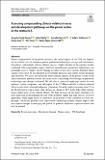Assessing compounding climate-related stresses and development pathways on the power sector in the central U.S.
Author(s)
Gurgel, Angelo Costa; Reilly, John; Morris, Jennifer; Schlosser, C. Adam; Gao, Xiang; Yuan, Mei; Tapia-Ahumada, Karen; ... Show more Show less
Download11027_2024_Article_10119.pdf (1.456Mb)
Publisher with Creative Commons License
Publisher with Creative Commons License
Creative Commons Attribution
Terms of use
Metadata
Show full item recordAbstract
Future configurations of the power system in the central region of the USA are dependent on relative costs of alternative power generation technologies, energy and environmental policies, and multiple climate-induced stresses. Higher demand in the summer months combined with compounding supply shocks in several power generation technologies can potentially cause a “perfect storm” leading to failure of the power system. Potential future climate stress must be incorporated in investment decisions and energy system planning and operation. We assess how projected future climate impacts on the power system would affect alternative pathways for the electricity sector considering a broad range of generation technologies and changes in demand. We calculate a “potential supply gap” metric for each pathway, system component, and sub-region of the US Heartland due to climate-induced effects on electricity demand and power generation. Potential supply gaps range from 5% in the North Central region under mild changes in climate to 21% in the Lakes-Mid Atlantic region under more severe climate change. We find increases in electricity demand to be more important in determining the size of the potential supply gap than stresses on power generation, while larger shares of renewables in the power system contribute to lower supply gaps. Our results provide a first step toward considering systemic climate impacts that may require changes in managing the grid or on potential additional capacity/reserves that may be needed.
Date issued
2024-03-18Department
Massachusetts Institute of Technology. Joint Program on the Science & Policy of Global ChangeJournal
Mitigation and Adaptation Strategies for Global Change
Publisher
Springer Netherlands
Citation
Mitigation and Adaptation Strategies for Global Change. 2024 Mar 18;29(4):27
Version: Final published version
ISSN
1381-2386
1573-1596
Keywords
Ecology, Global and Planetary Change